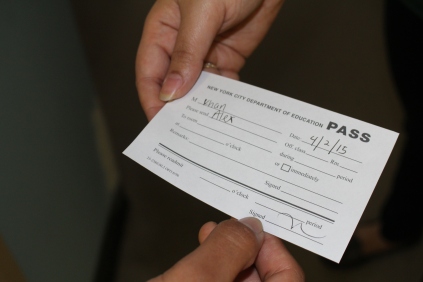Lose the Late Pass: Current Lateness Policy Is Ineffective

By FRANCIS KARAGODINS
We all know the infamous slip of paper: the late pass. Some, myself included, know it all too well. We’ve loved it, and we’ve hated it.
But mostly, we’ve hated it. And above all we’ve questioned it. Why, teacher, do you want me to get a late pass that will make me even more late?
Though the brief walk to the office might shave off a minute of a less favorite class, it seems terribly counter-intuitive. This, anyway, seems to be the consensus among students.
“It just makes people more late,” said junior Javon Canlas.
“It’s trash,” said sophomore Medina Leka.
“It’s ridiculous,” said freshman Matthew Perez.
Were I to quote the opinions of more students, this page would be asterisk-heavy.
Nathaly Arriola, the paraprofessional who manages the lateness log, says the current system is efficient in some cases, and inefficient in others.
“I’ve had students come up to the 3rd floor to sign in and get a pass to only go right back downstairs for gym class,” she said. “That takes up a lot of time.”
It certainly does.
Shelly, School Secretary, thinks the late passes should be distributed downstairs, “like one-stop shopping.”
Our new assistant principal, Mr. Bruss, agrees that the system is flawed. Though he acknowledges the importance of documenting lateness, he thinks the current process for doing so is “inefficient and susceptible to mistakes.”
“Currently we’re all dependent upon pieces of paper to confirm the check-in, so it’s difficult to see lateness patterns,” he explained.
Luckily, Mr. Bruss has now changed the system.
“I’ve developed a form that will log the students’ arrival in a spreadsheet, log that data in a student-specific late log document, and automatically email anyone who should know about that students late arrival,” he said.
A world without late passes does sound appealing.
Only now teachers and parents will be notified, via email, of a student’s lateness.
Teachers, of course, are not opposed. “A system that gets students, administrators, teachers and parents all on the same page stays true to the actual purpose of late passes, which is to hold students accountable for their commitments,” said Ms. Krugman, who teaches Writing 10 and Genocide & Human Rights.
However, according to Mr. Andrade, who teaches Spanish, the emails might not be enough to hold students accountable.
“There have to be other consequences for lateness,” he said.
Other than the loss of possibly useful academics, current consequences for lateness have been minor and ineffective. Most students, again myself included, would prefer that it stays this way.
But parental involvement weighs heavily. And now that parents will be notified of lateness, students might give up being fashionably late.
Moral of the story: be careful what you wish for.

You must be logged in to post a comment.